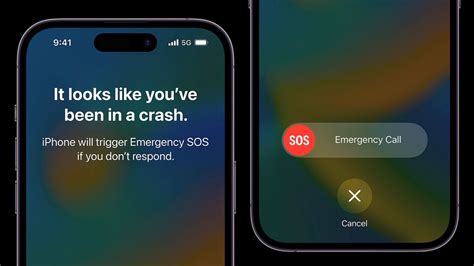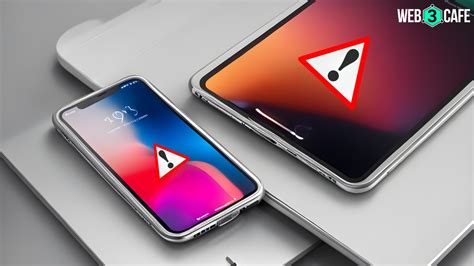Have you ever found yourself in a situation where your device fails to determine its current position? It can be quite frustrating, especially when you are relying on location-based services to navigate your way around town or find nearby attractions. You might be wondering why this problem occurs on your smartphone, questioning the accuracy of your device's built-in locator.
Nonetheless, fear not, as this article aims to shed light on the reasons behind this perplexing issue. Instead of pinpointing the blame solely on your trusty iPhone, we will explore the various factors that could potentially hinder the accurate detection of your device's geographic coordinates.
Throughout the article, we will dig deep into the technical aspects underlying the location detection process and discuss the possible obstacles that can impede this functionality. By unraveling the mysteries behind the scenes, we hope to equip you with a better understanding of why your iPhone's locator may experience hiccups and discover potential solutions to get it back on track.
Common Reasons for Unsuccessful Location Detection on iPhone

Despite the advanced technology built into iPhones and the capabilities of location tracking apps, there are certain situations where the iPhone may encounter difficulties in accurately detecting and displaying location information. Understanding these common reasons can help troubleshoot and resolve any issues related to location detection on your iPhone.
- Incorrect Location Services Settings: One of the most common reasons for location detection problems on an iPhone is incorrect settings in the Location Services. If the Location Services settings are disabled or not configured correctly, it can lead to inaccurate or no location information being displayed.
- Weak GPS or Cellular Signal: A weak GPS signal or poor cellular connection can also affect the iPhone's ability to detect its location accurately. Obstacles such as tall buildings or being in an area with limited cellular coverage can cause location detection issues.
- Software or App Glitches: Occasionally, software bugs or glitches in location tracking apps or the iPhone's operating system can lead to location detection problems. Keeping your iPhone's software up to date and ensuring location tracking apps are compatible with the OS can help address such issues.
- Restrictions and Privacy Settings: If the iPhone's privacy settings have restricted access to location services or location tracking for specific apps, it can hinder the accurate detection of the device's location. Checking and adjusting these settings can resolve any location detection problems.
- Temporary Location Data Inaccuracy: Sometimes, location detection may be temporarily inaccurate due to various factors like temporary interference or outdated map data used by the iPhone. By restarting the device or updating map data, the location detection accuracy can be improved.
Understanding these common reasons for why location detection may not be successful on an iPhone can help users effectively troubleshoot and resolve any issues they may encounter. By checking and adjusting settings, ensuring a strong signal, and staying up to date with software and app updates, users can improve the accuracy of location detection on their iPhones.
Disabled Location Services
In today's world, the ability to detect and track location has become an integral part of many applications and services. However, there are situations where the location services on an iPhone may not be functioning as expected. This section explores the issue of disabled location services and the possible reasons behind it.
Understanding the Problem
When the location services on an iPhone are disabled, it means that the phone is unable to determine its precise geographic location. This can affect various location-based features and applications that rely on accurate location data.
Privacy Concerns
One common reason for disabling location services is privacy concerns. Some users may choose to turn off location services to prevent apps from collecting their location data. While this can provide a sense of privacy, it also restricts the functionality of certain apps that rely on location information.
Battery Life
Another reason for disabled location services could be to conserve battery life. Location services require a significant amount of power, especially when using GPS. By disabling location services, users can extend the battery life of their iPhones.
Network or Hardware Issues
In certain cases, disabled location services could be a result of network or hardware issues. Poor network connectivity or malfunctioning GPS components can prevent the iPhone from accurately determining its location.
Enabling Location Services
If location services are disabled on an iPhone, users can enable them by going to the device's settings. By navigating to the "Privacy" section and selecting "Location Services," users can toggle the feature on or off for various apps and services.
It is important to note that enabling location services will allow apps to access and utilize the device's location data. Users should carefully consider the privacy implications before enabling this feature for every app.
In conclusion, disabled location services on an iPhone can be a result of privacy concerns, battery-saving measures, or network and hardware issues. Understanding the reasons behind disabled location services can help users troubleshoot and make informed decisions about enabling or disabling this feature.
Outdated iOS Version

In the context of the topic, the issue of location detection in the locator feature of your device might be attributed to having an outdated version of the iOS operating system. It is essential to keep your iOS version updated to ensure optimal performance and compatibility with various applications and features on your iPhone.
When you have an outdated iOS version, it could lead to a lack of support for the latest location detection technologies and protocols, potentially resulting in difficulties in accurately determining your device's location. Developers often release updates to address known issues, enhance functionality, and improve overall user experience, including location detection capabilities.
To resolve this issue, it is recommended to check for any available iOS updates and install them promptly. Updating your iOS version can be done through the Settings app on your iPhone. Once you navigate to the "Software Update" section, the device will check for any available updates. If an update is found, follow the on-screen instructions to download and install it.
Additionally, keeping your iOS version up to date also ensures the security of your device, as updates often include patches for identified vulnerabilities and potential security threats. Therefore, it is crucial to regularly check for updates and install them to ensure the smooth functioning of your iPhone's locator feature and other applications that rely on location detection.
| Benefits of Updating iOS: | |
| 1. | Improved location detection capabilities |
| 2. | Enhanced functionality and user experience |
| 3. | Increased security through vulnerability patches |
| 4. | Compatibility with the latest applications and features |
Simple Solutions for iPhone Location Identification Problems
In the realm of device positioning and tracing functionality, a number of individuals may encounter difficulties when using an iPhone. This section will shed light on potential remedies for issues related to pinpointing the user's whereabouts on an iPhone.
[MOVIES] [/MOVIES] [/MOVIES_ENABLED]FAQ
Why is my iPhone not detecting my location in the locator?
The issue could be due to several reasons. Firstly, ensure that location services are enabled for the app you are using. You can check this by going to Settings > Privacy > Location Services. If it is already enabled, try restarting your iPhone and see if that resolves the problem. Additionally, make sure you are in an area with a strong GPS signal. If none of these solutions work, there may be a software bug or hardware issue, and you may need to contact Apple support for further assistance.
What should I do if my iPhone's locator is not accurately detecting my location?
If the locator on your iPhone is not accurately detecting your location, there are a few steps you can take. First, ensure that you have a strong and stable internet connection, as this can affect the accuracy of your location. Additionally, make sure that your iPhone's GPS settings are enabled by going to Settings > Privacy > Location Services. If the issue persists, try restarting your iPhone and see if that helps. If not, there may be a software or hardware issue, and you may need to contact Apple support for further assistance.
Why does my iPhone's locator sometimes show incorrect locations?
There can be a few reasons why your iPhone's locator sometimes shows incorrect locations. One possible reason is that your iPhone's GPS signal is weak or unstable, which can lead to inaccurate location data. Another possibility is that there may be a software bug causing the incorrect location to be displayed. It is also worth checking if the app you are using has permission to access your location, as this can also affect the accuracy. If the problem persists, you can try restarting your iPhone or contacting Apple support for further assistance.
Is there a way to improve the accuracy of my iPhone's locator?
Yes, there are a few steps you can take to improve the accuracy of your iPhone's locator. Firstly, ensure that you have a stable and strong internet connection, as this can enhance the accuracy of the location data. Additionally, make sure that your iPhone's GPS settings and the location permissions for the app you are using are enabled. This will allow your iPhone to access more accurate location information. If you are indoors, try moving closer to a window or an open space to get a better GPS signal. If the problem continues, restarting your iPhone or updating to the latest software version may also help improve the accuracy of the locator.
What should I do if my iPhone's locator is consistently not working?
If your iPhone's locator is consistently not working, there are a few steps you can take to troubleshoot the issue. Firstly, ensure that location services are enabled for the app you are using by going to Settings > Privacy > Location Services. If it is already enabled, try restarting your iPhone and see if that resolves the problem. If the issue persists, make sure you have a stable internet connection and try moving to an open area with a stronger GPS signal. If none of these steps work, there may be a software bug or hardware issue with your iPhone's locator, and you may need to contact Apple support for further assistance.
Why is my iPhone unable to detect my location in the locator?
There could be several reasons why your iPhone is unable to detect your location in the locator. Firstly, ensure that you have enabled location services in your phone settings. If it is enabled, try restarting your iPhone and recalibrating the GPS. If the issue persists, it might be due to a software bug or hardware malfunction, and it is recommended to contact Apple support for further assistance.




